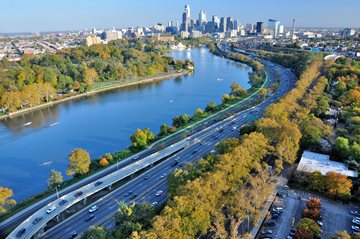What is county government? Pennsylvania has 67 individual governmental units designated as counties. Counties are distinguished into different classes based on their population. Interested in learning more, see counties by class.
Unlike most other states, Pennsylvania's counties geographically overlap municipalities such as boroughs, townships and cities, but they provide a different set of services. Therefore, every Pennsylvanian is both a resident of their county and their city, borough or township at the same time.
Counties are required by law to provide certain services to their citizens. Each county performs a wide range of different functions; as highlighted below.

County leaders plan to address fundamental issues such as the location of growth, environmental protection and housing needs, while helping account for future demand for services.
- Prepare comprehensive land use plans, including transportation and environmental planning.
- Review municipal planning, zoning and subdivision proposals.
- Provide guidance to promote regional land use consistency.
- Use GIS to analyze spatial information and databases and support county services.

Counties are responsible for all aspects of running elections in Pennsylvania under the state’s election code, the federal National Voter Registration Act and Help America Vote Act.
- Accept and verify new and changed voter registration applications.
- Conduct elections, including finding and training poll workers, maintaining election equipment.
- Finding polling places and processing absentee ballots.
- Verify and report election results.
- Fund primary, general and special elections.

Counties provide human services programs that protect the most vulnerable citizens in our communities.
- Administer state-mandated programs and services in areas including children and youth, drugs and alcohol, mental health and intellectual disability, nursing homes and long-term care, juvenile detention centers and juvenile justice, and housing, transportation and other critical support.
- Work toward better planning and integration of services to improve coordination and streamline programs.
- Advocate for state and federal funding for counties to meet critical service needs.

County corrections and prison management account for a large portion of the county budget. In Pennsylvania, 63 counties operate a jail.
- Provide funding for the lower judiciary, including the Courts of Common Pleas, the Magisterial District Justices (MDJs) and related support services.
- Receive a share of court costs collected through the Administrative Office of Pennsylvania Courts to aid the county’s court administration cost.
- Fund and operate county jails for offenders awaiting trial, or those serving sentences up to two years.
- Operate specialty courts and community corrections.
- Uphold state and federal standards for quality and safety in prison facilities.

Counties provide direction and coordination of emergency services for the protection of the people and resources in the county.
- Operate 9-1-1 call centers, call-taking and dispatch.
- Prepare and rehearse local all-hazards emergency response plans in coordination with federal, state and municipal agencies.
- Lead local and regional homeland security planning.

County assessment offices maintain the assessment rolls that are the basis of property taxation for counties, municipalities and school districts.
- Maintain property values to assure fairness, equity and uniformity.
- Hear assessment appeals from property owners.
- Oversee the process of determining values and update county tax records.
- Prepare reports, tax duplicates, and tax bills for political subdivisions.

Counties work alongside PennDOT and their planning organizations to ensure that transportation infrastructure meets citizen and business needs now and in the future.
- Own and maintain more than 4,000 county bridges.
- Operate more than 30 mass transit systems.
- Offer paratransit and medical assistance transportation.
- Offer input on commuter railroads, busses, etc. in metropolitan areas.

Counties are also involved in other functions of everyday life, touching the lives of every Pennsylvanian.
- Agriculture Conservation and Preservation
- Environmental Issues and Recycling
- Property and Civil Records Management
- Delinquent Real Estate Tax Collection
- Community and Economic Development

